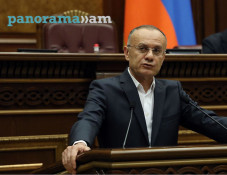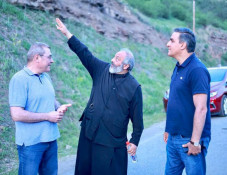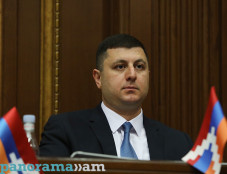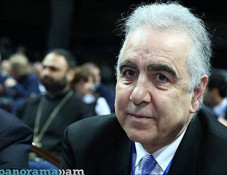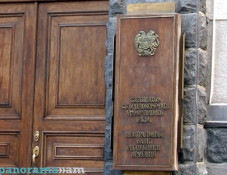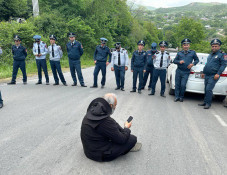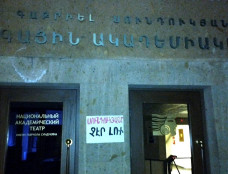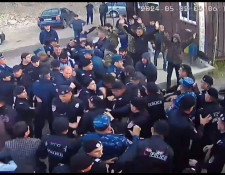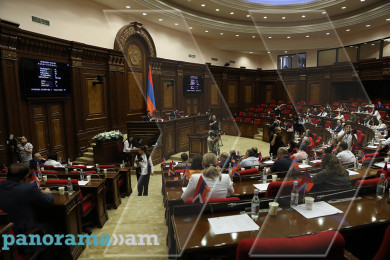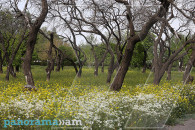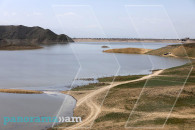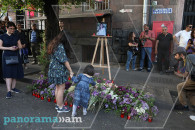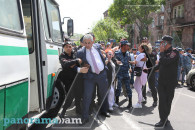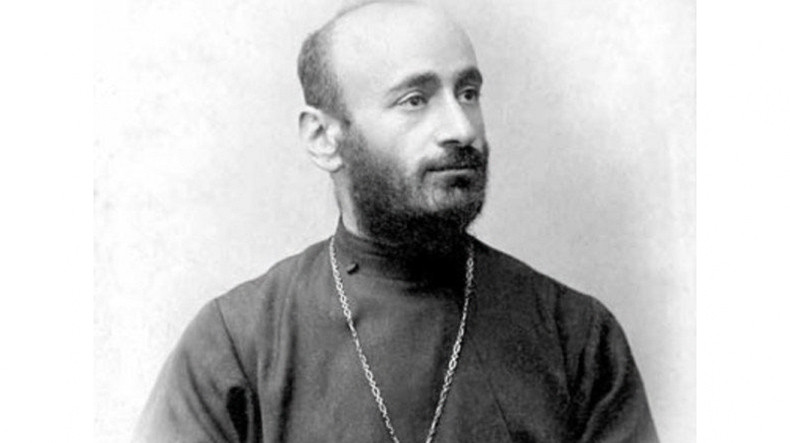
Today marks 148th birth anniversary of renowned Armenian composer Komitas
September 26, 2017 marks the 148th birth anniversary of renowned Armenian composer Komitas Vardapet. Komitas Museum-Institute has organized a series of events on the prominent composer’s birthday celebration.
Particularly, a visit to Komitas’s tomb in Komitas’s Pantheon is scheduled on 26 September, at 12:00. Lusine Sahakyan, PhD, Associate Professor, Head of the Chair of Music History of Komitas State Conservatory will deliver a talk on the topic of “Komitas and Armenian Art Music” at 13:00.
A concert by the State Chamber Choir of Armenia, directed by Robert Mlkeyan, is scheduled at 16:00. The concert program features works by Komitas, Tigran Mansuryan and Davit Halajyan.
Free entrance is due to all the events.
Komitas (a.k.a. Soghomon Soghomonyan), was born on September 26, 1869 in Anatolia, Turkey, in the town of Koutina (Ketaia). His father, Gevorg Soghomonyan was a shoemaker but he also composed songs and had a beautiful voice. The composer’s mother – Taguhi - was also singled out for her vivid musical abilities; she was a carpet weaver.
Komitas’s childhood was joyless and full of deprivations. He lost his mother when he was less than one year old, and because his father was too busy, his grandmother took care of him. At age 7 Komitas entered the local elementary school. As soon as he finished school his father sent him to Broosa to continue his education. However, he failed and 4 months later he came home having ultimately become an orphan: his father passed away and Soghomon was only 11 years old…
“He was a frail, weak, pale boy, always thoughtful and kind. He was dressed poorly,” one of his classmates recalled about Komitas.
Soghomon was often seen sleeping on the cold stones of the laundry room.
He could sing perfectly, and no wonder in Koutina he was nicknamed “a little vagrant singer.”
For his delightful voice Soghomonyan was also indebted to an event that fundamentally changed the entire course of his life.
In 1881 the priest of Koutina, G. Dertsakyan, had to leave for Etchmiadzin to be ordained a bishop. At the request of the Catholicos he brought the gifted orphan boy with him to study at the Etchmiadzin Church Seminary. Twelve-year old Soghomon was selected out of the other 20 orphans to study at the Seminary. As it was forbidden to speak Armenian at that time the boy spoke Turkish and when being greeted by the Catholicos Gevorg IV, he replied, “I don’t speak Armenian, if you wish I will sing.” Then with his fine soprano voice he sang an Armenian sharakan (a church hymn) without understanding the words. Due to his exclusive aptitude Soghomon overcame all the obstacles in a very short time and perfectly learned Armenian.
In 1890 Soghomon was ordained a monk.
In 1893 he finished studying at the seminary, then he was ordained a “Vardapet” (priest) and acquired his new name “Komitas” - the name of the outstanding poet of VII century, the author of sharakans. At the seminary Komitas was assigned to teach music.
Along with teaching, Komitas organized a choir, an orchestra of folk instruments, and treated folk songs; he made the first researches in the field of Armenian Church music.
In 1895 Komitas was ordained an archimandrite. In the autumn of the same year he left for Tiflis to study at the musical college. However, when he met the composer Makar Yekmalyan, who had received his education at the conservatory of Petersburg, he changed his mind and started studying a course on harmony by that composer. These studies became the original forerunner and the firm basis for gaining the European technique of composition.
The further events of Komitas’s life had to do with the large music center in Europe – Berlin, where he went to study under the protection of the Catholicos, being financed by the largest Armenian oil magnate Alexander Mantashyan.
Komitas entered the private conservatory of Professor Richard Schmidt. Within the conservatory Komitas took private classes on singing, elaborating his beautiful voice, fine baritone. Simultaneously with these classes, he also attended the lectures on Philosophy, Esthetics, General History and History of Music. During these academic years he had an opportunity to “communicate” with European music, continually enriching the supply of knowledge, and engaging in musical criticism. Upon the invitation of the International Music Association he held lectures devoted to the Armenian church and contemporary music in comparison with Turkish, Arabic and Kurdish music.
In September 1899 Komitas returned to Etchmiadzin and started his musical activity right away. In a short period he radically changed the system of teaching music in the seminary, organized a small orchestra and perfected the performance level of the choir.
He visited various regions of Armenia treating and putting down thousands of Armenian, Kurdish, Persian and Turkish songs.
He started serious scientific research work, studied Armenian folk and church melodies and worked on the decipherment of Armenian khazzes and on the theory of voices. In various countries of the world Komitas appeared as a performer and propagandist of Armenian music.
The composer began thinking over big, monumental musical forms. He had in mind to create the musical epic “Sasna tsrer” and continued working on the opera “Anush,” which he started back in 1904.
Komitas focused on the themes concerning folk music and revealed the content of folk songs. No doubt, such world outlook had to result in an inescapable conflict between Komitas and the Church. Gradually the indifference of new leaders, negative attitude of the backward group of the church figures, gossip and slander increased so much that it poisoned the life of the composer: the man who remained in the imagination of the contemporaries as an absolutely worldly man.
The conflict turned so tense that Komitas sent a letter to the Catholicos begging him to release him and let him create and live quietly. This request remained unanswered, and the persecution of Komitas became more obvious.
In 1910 Komitas left Etchmiadzin and went to Constantinople. There he expected to find the environment that would understand him, protect him, and encourage his activity; and here he would be able to fulfill his dreams. Komitas wanted to establish a National Conservatory with which he connected the further destiny of his people’s music. But the composer failed to accomplish this plan (as well as many others). His inspired ideas were only faced with the cold indifference of the local authorities.
In Constantinople Komitas organized a mixed choir of 300 men and called it “Gousan.” It was very popular. Armenian folk songs constituted most of its concerto program.
Komitas would often spend his time touring, giving presentations and lectures; he also acted as a soloist and conductor. He had the baritone, original for its richness and expressiveness. Due to the wide range of his voice Komitas could also sing part of the tenor. He also wonderfully mastered the flute and the piano. He was endowed with great power to influence his audience.
The well-known musicians Vincent D’Andy, Gabriel Fore, Camille Sen-Sans fell in love with Komitas’ creative work.
In 1906 after one of the concertos the outstanding French composer Claude Debussi exclaimed excitedly: “Brilliant father Komitas! I bow before your musical genius!”
In Constantinople Komitas could not find any unconditional like-minded people who would help him implement his plans. Moreover, while in Etchmiadzin he was together with his native people and close to its living style and art, in Constantinople he was deprived of it. Nevertheless, he continued to work hard. Komitas paid special attention to the composition of church music. His masterpiece “Patarag” (“Liturgy”) is written for the male chorus.
Musicology was also an important field for him. In Paris at the Conference of the International Music Society he gave two presentations: “Armenian Folk Music” and “On Old and New Notation of Armenian Spiritual Music.” These provoked great interest among the participants of the conference. Komitas was also requested to give a spontaneous presentation on the topic: “On Time, Place, Accentuation and Rhythm of Armenian Music.”
In the period of World War I the government of Young Turks initiated their monstrous program on violent and inhumane extermination of part of the Armenian people. In April 1915, Komitas was arrested together with the number of outstanding Armenian writers, publicists, physicians, and lawyers. After the arrest, accompanied by violence, he was deported far in Anatolia where he became a witness of the brutal extermination of the nation’s bright minds. And in spite of the fact that due to the intervention of influential figures Komitas was returned to Constantinople, the nightmare he had experienced left a deep ineradicable impression on his soul. Komitas remained in seclusion from the outer world, absorbed in his gloomy and heavy thoughts – sad and broken.
In 1916 Komitas’ health deteriorated and he was put in a psychiatric hospital. However, there was no hope that he would recover. The medicine was powerless against the destructive disease.
The genius of Armenian music found his final shelter in Paris, in the suburban sanatorium Vil-Jouif where he spent almost 20 years of his life.
On 22 October the life of the Great Komitas came to an end. In the spring of 1936, his remains were transported to Armenia and buried in Yerevan – in the Pantheon of Prominent Art Figures.
Newsfeed
Videos





